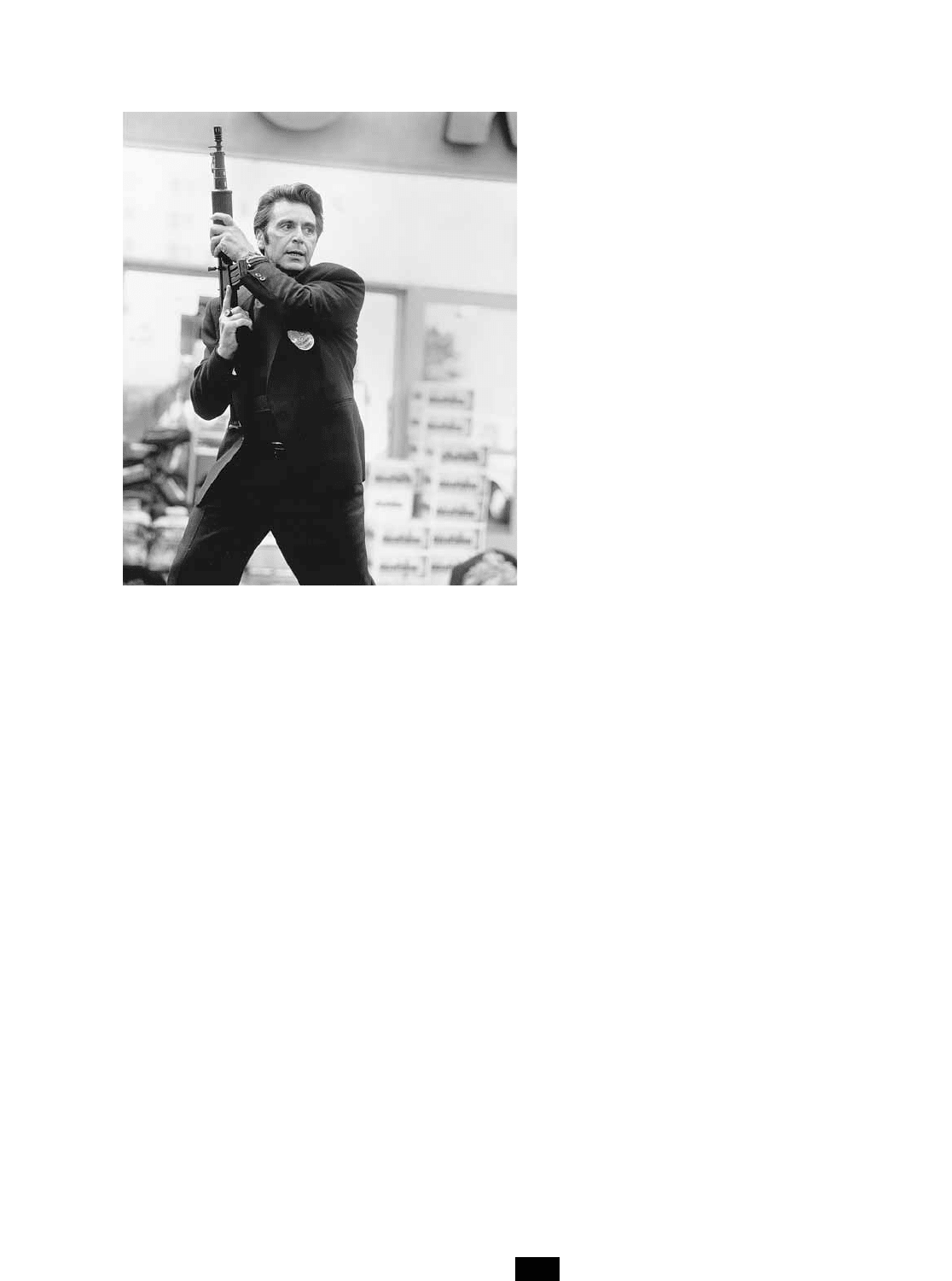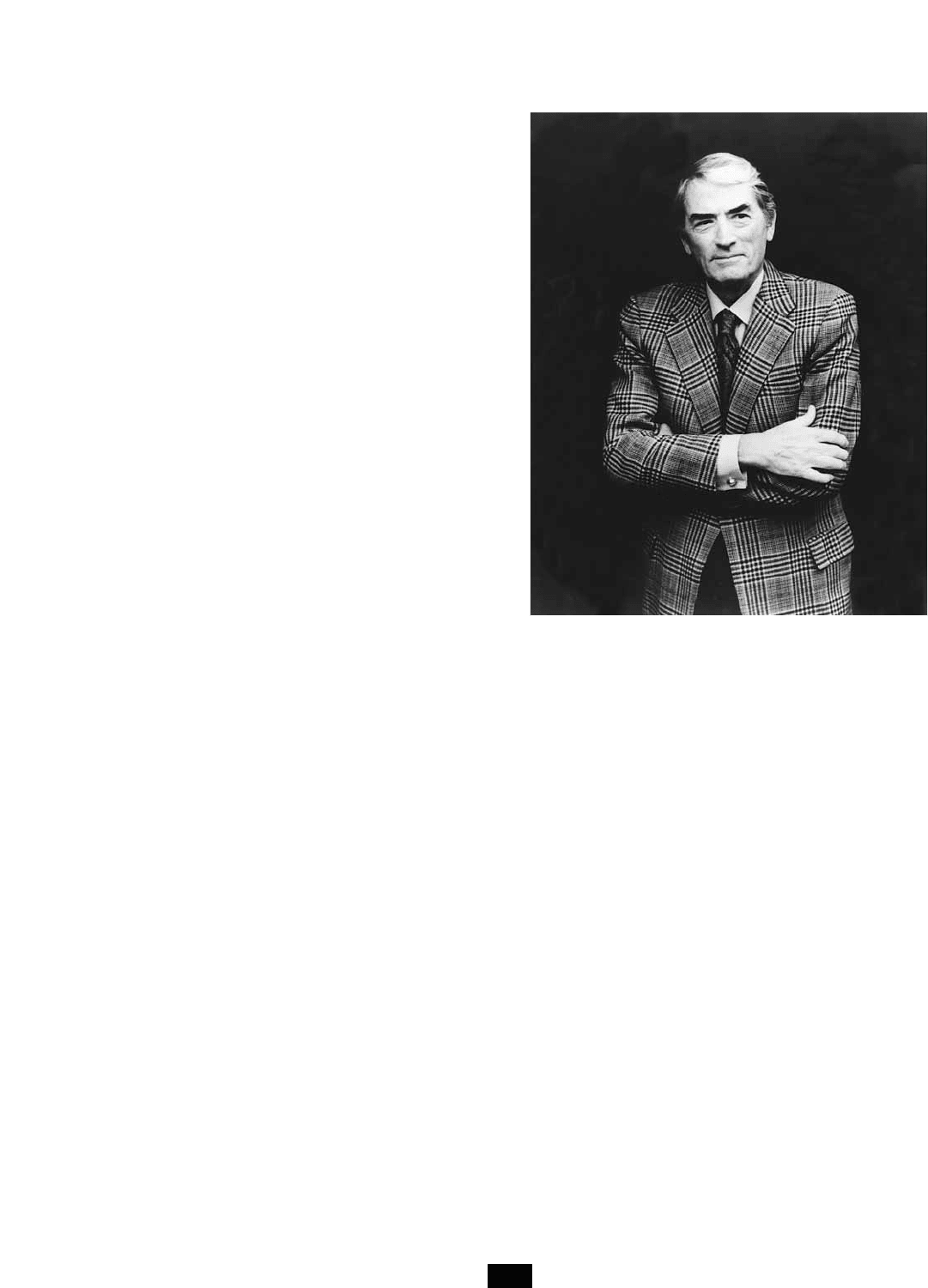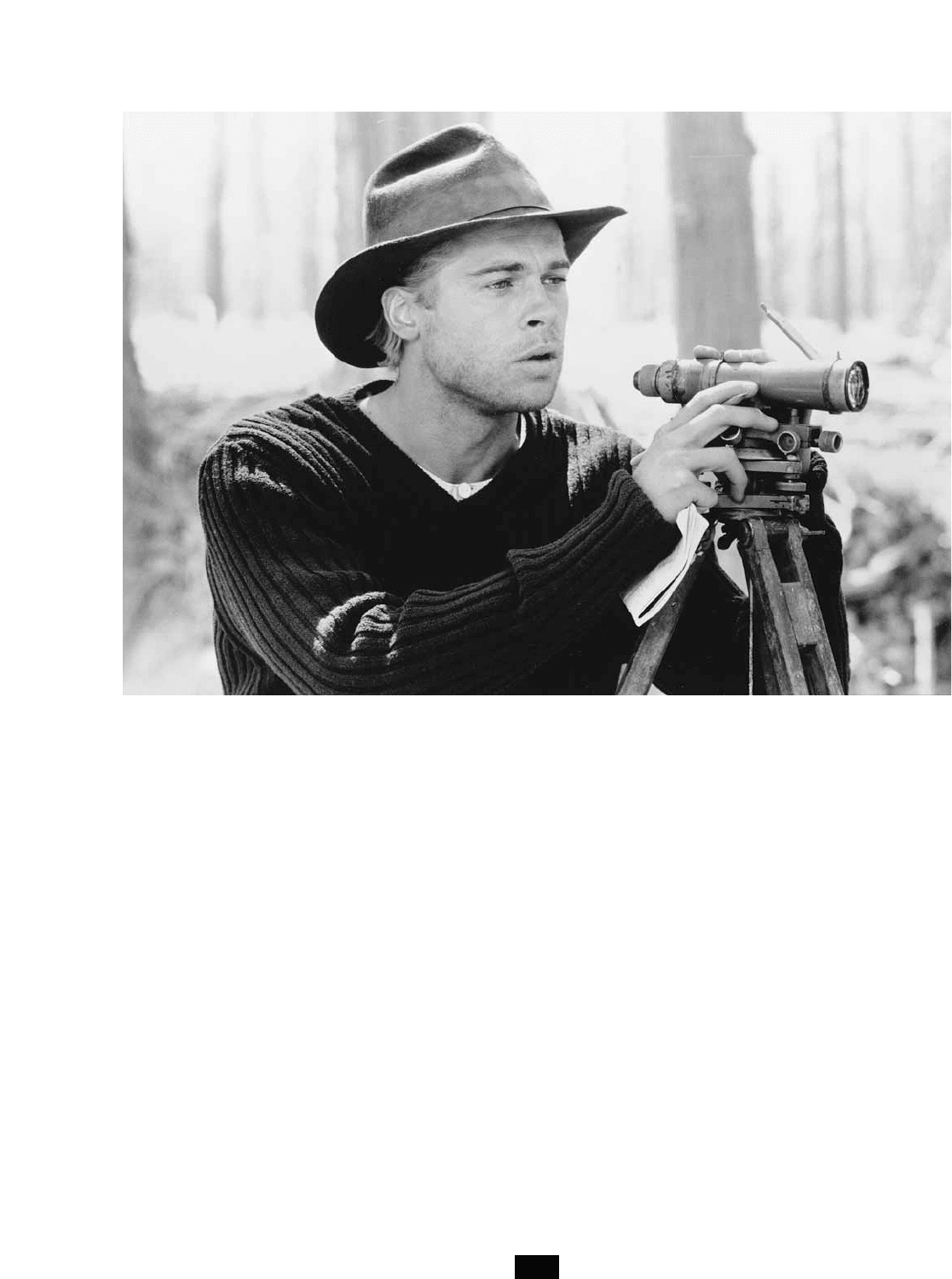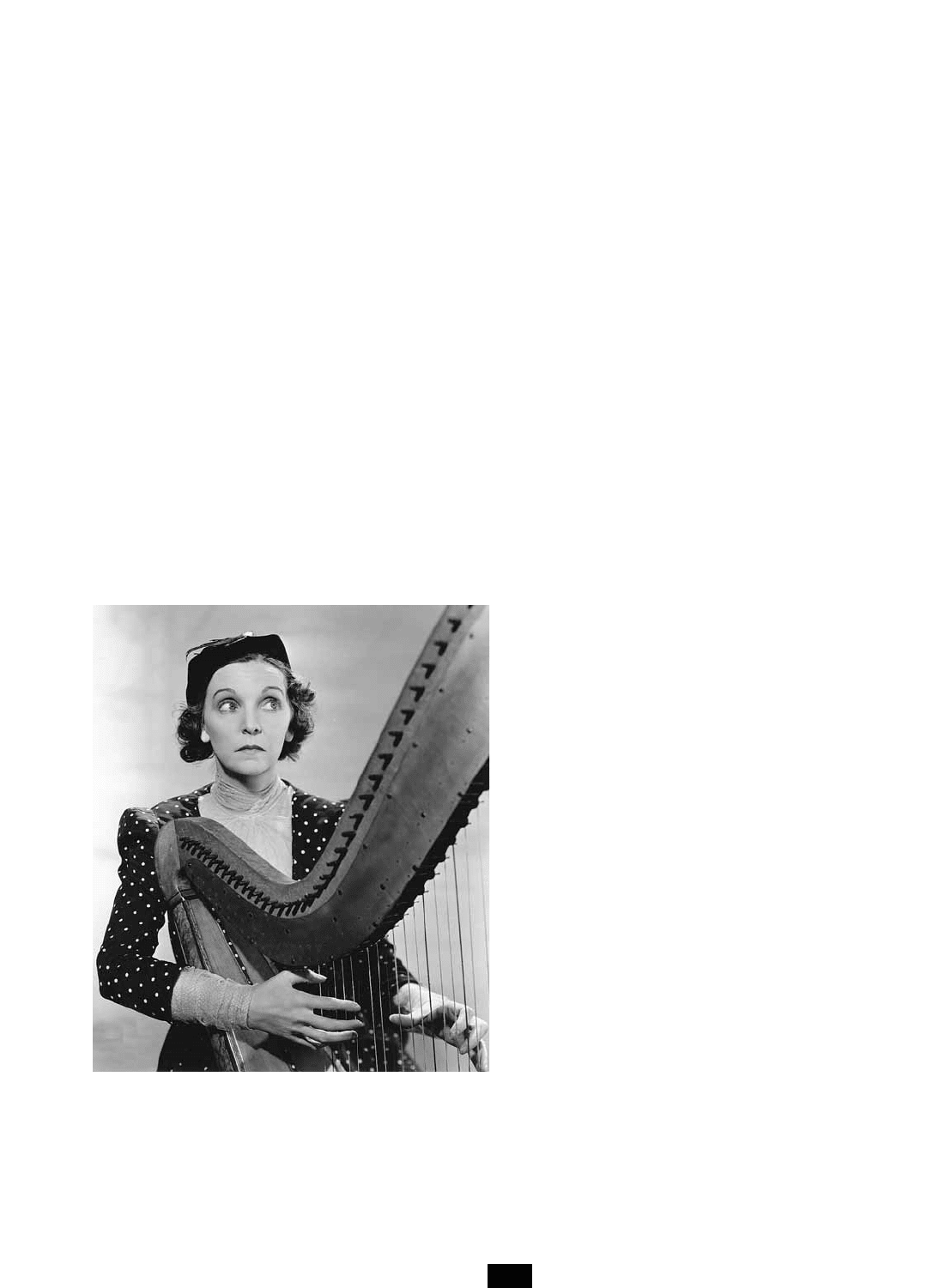Siegel S., Siegel B. The Encyclopedia Of Hollywood
Подождите немного. Документ загружается.


of sorts in Frankie and Johnny (1991), assuming the role of an
ex-con who works as a cook;
MICHELLE PFEIFFER
was the
waitress who eventually falls for him. His most remarkable
role during the early 1990s, however, was in Scent of a Woman
(1992), a blind military officer bent on suicide. The most
memorable sequence in the film involved his tango with a
beautiful young woman waiting for her dinner date to arrive.
This role brought him an Oscar for Best Actor.
In 1996, he directed and played in Looking for Richard, an
offbeat semidocumentary about a filmmakers’s attempts to
come to terms with Shakespeare’s Richard III; the film won
the Directors Guild of America Best Feature Documentary
award. In Donnie Brasco (1997), he returned to the under-
world as the mob mentor to an undercover agent. He was at
his devilish best as the Satanic figure in The Devil’s Advocate
(1997), playing the head of a law firm. He had a more sym-
pathetic role as the professional football coach in Any Given
Sunday (1999). Pacino provided strong support to
RUSSELL
CROWE
in Michael Mann’s The Insider (1999), playing the
tough 60 Minutes producer Lowell Bergman. In The Recruit
(2002), he played CIA professional Walter Burke, who
recruits computer genius James Clayton (Colin Farrell) into
the CIA. Pacino’s performance was typical of his recent work.
See also
THE GODFATHER
and
THE GODFATHER
,
PART II
.
Page, Geraldine (1924–1987) She is an actress who
often played vulnerable, eccentric women. Page’s riveting
screen performances in a relatively modest number of films
brought her a staggering eight Academy Award nominations
and one Best Actress Oscar. Essentially a character actress for
most of her film career, she assumed an impressive variety of
roles in everything from Clint Eastwood films to Woody
Allen dramas.
The daughter of a doctor, Miss Page was determined to
become an actress, beginning her quest at the age of 17 by
working in stock. A modest reputation in the theater led to
her movie debut in the forgettable Out of the Night (1947). She
returned to the stage and eventually achieved theatrical star-
dom with her critically acclaimed Off-Broadway performance
in Tennessee Williams’s Summer and Smoke in 1952.
Thanks to her newfound celebrity as a stage actress, she
was invited back to Hollywood and starred in two films, Taxi
(1953) and the
JOHN WAYNE
hit Hondo (1953), garnering the
first of her Academy Award nominations for the latter, this one
for Best Supporting Actress. Despite the nomination, Page was
not immediately enamored of the movie business and, instead,
pursued her stage career. She didn’t return to the movies until
she reprised her role in Summer and Smoke in a film version of
the play in 1961, gaining her second Oscar nomination, this
time in the Best Actress category. It was at this point that she
began to act in the movies on a semiregular basis.
Appearing in character roles, Page also gained Oscar
nominations for Best Supporting Actress for her work in
You’re a Big Boy Now (1967), Pete ’n’ Tillie (1972), and The Pope
of Greenwich Village (1984). Her additional Best Actress Oscar
nominations were for Sweet Bird of Youth (1962), Interiors
(1978), and The Trip to Bountiful (1985), that film finally bring-
ing her a much-deserved Oscar for her portrayal of a crotch-
ety old lady who must see her old home again before she dies.
Altogether, Page appeared in fewer than 25 films. Among
those relatively rare performances for which she was not
nominated were those in Toys in the Attic (1963), The Happiest
Millionaire (1967), What Ever Happened to Aunt Alice? (1969),
The Beguiled (1971), J. W. Coop (1972), Day of the Locust
(1975), Nasty Habits (1976), The Three Sisters (1977), Honky
Tonk Freeway (1981), and I’m Dancing as Fast As I Can (1982).
Page also worked in television, winning two Emmys, but
was most devoted to the theater throughout her career, as
evidenced by her election to the Theater Hall of Fame. She
was long married to her second husband, the noted stage,
screen, and TV actor Rip Torn.
Pakula, Alan J. (1928–1998) A highly successful pro-
ducer-director who made films about social and political
issues. He displayed a unique visual style that used architec-
ture to conjure up feelings of impending doom and terror in
his audience.
Pakula was interested in show business from a very early
age. After graduating from Yale School of Drama, he went to
Hollywood and gained a foothold in the industry with a low-
level job at Warners’ cartoon factory in 1949. By 1951 he was
working at Paramount in the production department, learn-
ing the technical aspects of moviemaking. Pakula was being
groomed as a future producer, and he fulfilled his promise by
PAGE, GERALDINE
308
Al Pacino in Heat (1995) (PHOTO COURTESY WARNER
BROS.)

producing his first film in 1957, the Jimmy Piersall baseball
biopic Fear Strikes Out.
Later, Pakula formed a production company in associa-
tion with director Robert Mulligan. Together, they collabo-
rated on six films, with Pakula producing and Mulligan
directing. Their very first venture was the critical and box-
office smash hit, To Kill a Mockingbird (1962). It was followed
by Love with the Proper Stranger (1963), Baby, the Rain Must
Fall (1965), Inside Daisy Clover (1965), Up the Down Staircase
(1967), and The Stalking Moon (1969).
A proven success as a producer, Pakula decided in 1969 to
try his hand at directing his own production of The Sterile
Cuckoo. The film, which gave Liza Minnelli her first starring
role, was a modest success. He followed it with a major hit,
producing and directing the thriller Klute (1971), the first of
his atmospheric, visually ominous movies.
His ability to render an oppressive physical reality on film
was even more evident in The Parallax View (1974), a stark
depiction of political corruption and manipulation that Pakula
also produced. Despite the fact that The Parallax View failed at
the box office, Pakula was clearly the perfect director for the
big-budget movie version of Robert Woodward and Carl
Bernstein’s book All the President’s Men (1976). In this case, the
air of paranoia heightened by the director’s visual flair seemed
perfectly in keeping with the realities of the Watergate
coverup that it depicted. A sense of fear and tension was main-
tained throughout the movie, thanks to his direction, which
was honored with a Best Director Oscar nomination.
Pakula continued to make films that placed his characters
in a harsh and often overwhelming world of deceit, violence,
and apprehension. Whether in the old West, as in Comes a
Horseman, the world of high finance, as in Rollover (1981), or
in the minds of those crippled by the cruel forces of society,
as in Sophie’s Choice (1982) and Orphans (1987), Pakula
expressed a deeply felt empathy for his seemingly doomed
heroes who struggle against the dark.
Happily, Pakula was not relentlessly somber in his con-
cerns. He also demonstrated a fine sense of humor, produc-
ing and directing a couple of witty and biting love stories,
Love and Pain and the Whole Damned Thing (1973), Starting
Over (1979), and See You in the Morning (1989).
His Presumed Innocent (1990), starring Harrison Ford and
Raul Julia, and his The Pelican Brief (1993), starring Julia
Roberts and Denzel Washington, were both thrillers about
political and judicial corruption. In fact, The Pelican Brief
brought Pakula back to the industry as a major player. Unfor-
tunately, The Devil’s Own (1996), again starring Harrison
Ford and again focusing on political issues, in this case the
IRA, had problems in production and failed to satisfy critics
and audiences. In 1998 Pakula died in a freak accident: While
driving his car on the freeway, Pakula was struck by a metal
pipe that went through the windshield of his car and struck
him in the head.
Pan, Hermes (1910–1990) One of Hollywood’s great-
est dance directors, he enjoyed a long and fruitful collabora-
tion with
FRED ASTAIRE
. Pan also created imaginative dance
routines for
BETTY GRABLE
in her most enjoyable movies of
the 1940s, as well as for many of Hollywood’s big-budget
musicals of the 1950s and early 1960s.
Born Hermes Panagiotopulos in Tennessee, Pan was an
assistant dance director at RKO when he helped Astaire work
out his dance numbers in his first film, Flying Down to Rio
(1933). The two became not only fast friends but also part-
ners, with Pan intimately involved in the choreography of the
majority of Astaire’s greatest dance numbers in many of his
films, including all of the Astaire/Rogers movies. He won an
Oscar for his work on A Damsel in Distress (1937) as well as
for later Astaire films such as Blue Skies (1946), Silk Stockings
(1957), and Finian’s Rainbow (1968).
His choreography for Betty Grable in films such as Coney
Island (1943) and Sweet Rosie O’Grady (1943) took advantage
of the star’s legs without overtaxing her talents.
If one looks closely, Pan can be seen dancing in a number
of films, including Moon over Miami (1941), My Gal Sal
(1942), and Pin Up Girl (1944). He’s the one with an uncanny
resemblance to Fred Astaire.
Pan was superb at choreographing intimate dance num-
bers, but he showed surprising versatility late in his career
when, in the late 1950s, he created lavish production num-
bers for Porgy and Bess (1959), Can-Can (1960), and Flower
Drum Song (1961). Pan continued to choreograph into the
1970s, bringing his talents to Darling Lili (1970) and the
musical remake of Lost Horizon (1973).
Considering how much popular dance had changed in his
40 years of choreographing and directing dance numbers,
Pan’s longevity in Hollywood was particularly astonishing.
See also
CHOREOGRAPHER
.
Paramount Pictures One of Hollywood’s Big Five film
companies, Paramount’s ancestry goes back further than that
of any other presently active movie company. In 1912, a fur-
rier-turned-entrepreneur,
ADOLPH ZUKOR
, incorporated
the Famous Players Film Company, which successfully
launched a series of prestige movie adaptations of popular
stage plays, including Queen Elizabeth with Sarah Bernhardt.
In 1916, Famous Players merged with the
JESSE L
.
LASKY
Feature Play Company, which boasted a roster of stage and
screen talent such as David Belasco, Samuel Goldwyn, and
CECIL B
.
DEMILLE
(the Lasky–DeMille Squaw Man [1913]
was one of the first feature-length movies made in the
Hollywood/Los Angeles area). The distribution network for
Famous Players–Lasky was a company formed in 1914 by
W. W. Hodkinson called Paramount.
By 1917, other production companies began to release
through Paramount, including Artcraft, which had two of the
biggest movie stars, Mary Pickford and Douglas Fairbanks.
Acquisition of more movie theaters began in the 1920s.
Adolph Zukor took over the reins of the business operations
in New York City, and Jesse Lasky oversaw production in
Hollywood. In 1930, the corporate name became the Para-
mount Publix Corporation.
Paramount’s first all-talking feature was Interference in
1928. Although Paramount was by now one of the biggest
PARAMOUNT PICTURES
309

studio operations in America, the company overextended
itself investing in its theater chain (it owned more than 1,200
theaters in 1930, for example), and depression-related diffi-
culties forced it into bankruptcy in 1933. Lasky was forced
out. Zukor became chairman of the board when it was reor-
ganized in 1935 as Paramount Pictures, Inc. The 1930s and
1940s were Paramount’s peak period as the studio continued
the policy originated by Famous Players of utilizing talent
developed in other media—radio, recording, vaudeville, and
the legitimate stage. Top directors included
ERNST
LUBITSCH
,
ROUBEN MAMOULIAN
,
JOSEF VON STERNBERG
,
and
BILLY WILDER
; stars included
MAE WEST
,
JEANETTE
MACDONALD
,
THE MARX BROTHERS
,
W
.
C
.
FIELDS
,
BING
CROSBY
,
GARY COOPER
, and Martin and Lewis. Some of the
most successful pictures were Preston Sturges’s comedies
from the 1940s, such as The Lady Eve (1941), such musicals
as Holiday Inn (1942), and the Crosby–Hope road pictures,
beginning with Road to Singapore (1940). Later releases
included several
ALFRED HITCHCOCK
pictures, including
Vertigo (1958) and Psycho (1960); the
FRANCIS FORD COP
-
POLA
Godfather series; the Star Trek series; and the Indiana
Jones series.
In 1949, as a result of the epochal “Paramount Case,” the
Supreme Court forced it and other studios to divest them-
selves of their chains of theaters. Meanwhile, Paramount’s
president, Barney Balaban, pushed the development of a
wide-screen system competitive with Fox’s CinemaScope.
VistaVision, a nonanamorphic process that utilized two
frames of 35 mm film, premiered with White Christmas
(1954). Dissatisfied with its efforts to promote the projection
of television programs onto theater screens (to compete with
free home television), Paramount sold its pre-1948 film
library to MCA in 1958 for $50 million. In 1966 Gulf and
Western Industries acquired Paramount, marking the first
entry of a conglomerate into the film industry. In 1980, Para-
mount launched the USA cable channel.
In later years, Paramount had major hits with Saturday
Night Fever (1977), Heaven Can Wait (1978), Grease (1978),
Reds (1981), Flashdance (1983), Fatal Attraction (1987), The
Untouchables (1987), Coming to America (1988), and The
Accused (1988). Sequels are part of the studio’s success, with
notable series such as the Star Trek movies (starting in 1979),
the Raiders of the Lost Ark/Indiana Jones saga, the Bad News
Bears comedies, the satirical Airplane! flicks, plus the Beverly
Hills Cop, Naked Gun, 48 Hours films, and the seemingly end-
less Friday the 13th horror series. In 1994, Viacom acquired
Paramount Pictures for $10 billion. Five years later, in 1999,
Viacom added to its assets CBS, the television network. In
2002, Viacom bought the nearby KCAL studios.
As part of Paramount’s celebration for its 90th anniver-
sary, the company has redesigned the traditional logo with
the legend “90th anniversary,” which appears over the moun-
tain of the classic emblem. Films released in 2002, such as We
Were Soldiers, feature the new insignia. William W. Hodkin-
son, one of the founders of Paramount, created the logo
based on memories of mountains near Ogden, Utah, his
hometown. In a statement, Jonathan Dolgen, chairman of
the Viacom Entertainment Group, said, “We wanted to
maintain the integrity and historical value of our original
logo while incorporating design elements commemorating
our 90th Anniversary.”
According to the Seeing Stars website, Paramount is a
huge studio, covering an area almost as big as Disneyland. At
peak season, the studio employs more than 5,000 people. Just
driving around the outside of the studio walls will give you an
indication of the studio’s vast size. A tall watertower with the
blue Paramount mountain logo still looms over the lot, a
throwback to the days when the studio had its own fire
department and hospital. Recent notable Paramount releases
include The Talented Mr. Ripley (1999), Sleepy Hollow (1999),
Mission: Impossible II (2000), Shaft (2000), Vanilla Sky (2001),
We Were Soldiers (2002).
Parsons, Louella See
GOSSIP COLUMNISTS
.
Peck, Gregory (1916–2003) He starred in more than
50 movies in a film career spanning five decades. Tall, lean,
and handsome, Peck was often compared to
GARY COOPER
and, with his strong image of integrity and dignity,
HENRY
FONDA
. Curiously, Peck’s screen persona was more brittle
than that of either actor; yet his distance, his aloofness, cou-
pled with his deep, authoritative voice, gave him a bigger-
than-life quality that was well suited to many of the heroic
roles he assumed.
Born Eldred Gregory Peck in La Jolla, California, the
young man was a pre-med student and an athlete before a
spinal injury left him temporarily paralyzed. During his
recovery, he turned to the theater and was encouraged to
become an actor. Armed with a letter of introduction to a
business friend of his stepfather’s, he set out for Broadway in
1939. The letter got him a job—as a barker at a concession in
the amusement zone at the New York World’s Fair. Later he
became a guide at Radio City Music Hall. Meanwhile, Peck
won an audition for a scholarship at the respected Neighbor-
hood Playhouse School of Dramatics. He cut his actor’s teeth
on a road tour of The Doctor’s Dilemma, his big break coming
when he was signed for the Broadway production of Morning
Star in 1942.
He worked on Broadway throughout the early 1940s
until he was hired to star in his first movie, Days of Glory
(1944). The film was a flop, but critics singled him out for
praise, and his career took off with his second film, The Keys
of the Kingdom (1944), for which he won an Oscar nomination
for Best Actor.
Peck had the good fortune of working with a great many
of Hollywood’s leading directors, starring in such films as
ALFRED HITCHCOCK
’s Spellbound (1945), Clarence Brown’s
The Yearling (1946), which brought him his second Academy
nomination for Best Actor, and Elia Kazan’s Gentlemen’s
Agreement (1947), for which he received yet another Oscar
nomination. It was a heady time for the young actor, espe-
cially when he was paired with
JENNIFER JONES
in the
DAVID
O
.
SELZNICK
production of Duel in the Sun (1946), an epic
western directed by
KING VIDOR
. Virtually overnight, Peck
PARSONS, LOUELLA
310

had become one of Hollywood’s most versatile leading men,
having the best of both worlds as a matinee idol and serious
dramatic actor.
Of all the directors Peck worked with, the one with
whom he is most closely associated is
HENRY KING
, who
guided the actor through many of his biggest critical and
commercial hits, including Twelve O’Clock High (1949), which
brought him his fourth Oscar nomination, and the highly
praised psychological western, The Gunfighter (1950).
Peck developed a reputation as a western star thanks to his
roles in Duel in the Sun, The Gunfighter, and other horse
operas such as Yellow Sky (1948) and Only the Valiant (1951). In
one of his rare career mistakes, the actor turned down the lead
role in High Noon because he feared he was being typed as a
cowboy star. Gary Cooper took the role and won an Oscar.
Throughout the 1950s, Peck continued to work with pri-
marily top-flight directors, often in challenging films. Among
his most ambitious movies were Raoul Walsh’s lively version
of Captain Horatio Hornblower (1951), Henry King’s adapta-
tion of Hemingway’s The Snows of Kilimanjaro (1952),
William Wyler’s Roman Holiday (1953), Nunnally Johnson’s
The Man in the Gray Flannel Suit (1956), and
JOHN HUSTON
’s
Moby Dick (1956).
Peck had as many hits as he did misses, but no one could
accuse him of choosing obviously commercial projects. He
became more aware of financial considerations, however,
when he began to produce his own films, among them The
Big Country (1958), Pork Chop Hill (1959), The Guns of
Navarone (1961), which was one of his biggest hits, Cape Fear
(1962), and To Kill a Mockingbird (1962), the film that finally
brought him a Best Actor
ACADEMY AWARD
.
To Kill a Mockingbird marked the pinnacle of Peck’s career,
both critically and at the box office. He would have a number
of hits in the years to follow but nothing of that magnitude.
As the decade wore on, he made the mistake of starring in
westerns when such films were no longer very popular.
Nonetheless, at least he made a good one, The Stalking Moon
(1969), but afterward, his career went into a slump that con-
tinued well into the 1970s.
It wasn’t until Peck added his considerable stature to a
big-budget horror movie hit, The Omen (1976), that his
career was resurrected. Unfortunately, he followed that suc-
cess with the megaflop MacArthur (1977). Then, in a surprise
move, Peck took a role against type playing the Nazi Dr.
Josef Mengele in The Boys from Brazil (1978). The film
brought him his best notices in more than a decade. He
appeared in relatively few movies afterward, although his
work pace accelerated somewhat in the latter half of the
1980s when he appeared in such films as Amazing Grace and
Chuck (1987), in which this Lincolnesque actor found himself
playing the president of the United States, and Old Gringo
(1989), in which he starred with
JANE FONDA
.
If Peck’s film career was variable in the last decades of his
life, his work for the film industry was not. He was president
of the Academy of Motion Picture Arts and Sciences between
1967 and 1970, winning the
JEAN HERSHOLT
Humanitarian
Award in 1968. In addition, he was the first chairman of the
American Film Institute, and he sat on the AFI’s Board of
Trustees. In 1989 he was honored with the AFI’s Life
Achievement Award.
In 1991, he was cast as the CEO of a dying cable com-
pany in Other People’s Money; insisting on the responsibility
the company has to the town, he fights the takeover bid by
“Larry the Liquidator” (Danny DeVito), who makes the case
for the “bottom line.” Peck also did some films for television,
The Portrait (1993) and Moby Dick (1998), this time playing
the thundering Father Mapple, who delivers a fire-and-brim-
stone sermon (in the 1956 version he played Ahab, and
ORSON WELLES
played the preacher).
Peckinpah, Sam (1926–1984) Probably the most con-
troversial American director of the 1960s and early 1970s, in
14 films, Peckinpah, with his propensity to depict graphic
mayhem, provoked a highly charged public debate about vio-
lence in the movies. Complicating the debate was the fact that
Peckinpah clearly had a consistent personal vision and was not
an exploitative filmmaker. Violence was central to a Peckin-
pah story because his misfit heroes had to fight to find the
human heart within their savage souls.
PECKINPAH, SAM
311
Gregory Peck’s image of moral rectitude was gained
through performances in such films as Gentlemen’s
Agreement (1947), Captain Horatio Hornblower (1951), and
To Kill a Mockingbird (1962). Ironically, he originally came
to the movies as a heartthrob.
(PHOTO COURTESY OF
GREGORY PECK)

Born Samuel David Peckinpah, he grew up in California
and received a M.A. in drama from USC. He worked in the
theater as both a director and an actor, eventually taking a job
at a Los Angeles TV station.
Peckinpah made the transition to the movies in the mid-
1950s when he became the dialogue director on several
DON
-
ALD SIEGEL
films, beginning with Riot in Cell Block 11 (1954).
Peckinpah learned a great deal about directing action films
by working with Siegel, and he gained writing experience as
well, rewriting the script for one of that director’s most
admired movies, Invasion of the Body Snatchers (1956).
In the later 1950s, Peckinpah returned to television,
achieving success as a writer. He penned scripts for a host of
prime-time shows, a preponderance of them westerns, such
as Gunsmoke, The Rifleman, and Broken Arrow.
Peckinpah’s reputation with westerns led to his opportu-
nity to direct a low-budget horse opera in 1961, The Deadly
Companions. There was nothing in this film to suggest the
brilliance he would later demonstrate. His sophomore effort,
Ride the High Country (1961), was the sleeper hit of the year,
a film that lovingly brought together two screen legends,
JOEL MCCREA
and
RANDOLPH SCOTT
, in an evocative and
deeply felt movie about the value of friendship and honor.
The director’s next film, Major Dundee (1965), nearly
destroyed his career but showed him to be a man of ambi-
tious artistic vision. Peckinpah coscripted as well as directed
Major Dundee, a movie considered by many to be a near mas-
terpiece tragically destroyed by its producer, who substan-
tially shortened the movie in the editing process. Bloody but
unbowed, Peckinpah fought back to make The Wild Bunch
(1969), the movie that catapulted him to a place among the
top directors of his era. This film was his fully realized mas-
terpiece, but it was attacked by critics because it seemed to
glorify violence. The film was so complex, however, that to
merely emphasize its violence was to miss the point entirely.
He followed The Wild Bunch with the highly underrated
The Ballad of Cable Hogue (1970), a movie that showed a gentler
side of Peckinpah. But the director stunned movie audiences
with his next film, Straw Dogs (1971), depicting in a contempo-
rary setting the violence and brutality associated with his west-
erns. Critics and audiences were shocked, but the movie was a
hit and Peckinpah weathered the storm of protest, explaining
his viewpoint that modern man was not only capable of acts of
brutality but also that such acts were often necessary.
Peckinpah’s career held steady in the early 1970s with the
pleasant Junior Bonner (1972), the action film The Getaway
(1972), and the somewhat muddled but entertaining Pat Gar-
rett and Billy the Kid (1973). Then, suddenly, Peckinpah
seemed to lose his touch. Bring Me the Head of Alfredo Garcia
(1974), The Killer Elite (1975), Convoy (1978), and The Oster-
man Weekend (1983) were mediocre to awful. Peckinpah did
make one solidly intelligent and engrossing film during this
period of decline, Cross of Iron (1977), but it received little
attention at the box office.
Penn, Arthur (1922– ) A director whose protagonists
are often outsiders and loners searching for a place in a soci-
ety that often ignores them. Penn has been a movie director
since the late 1950s, but he had his greatest impact during the
late 1960s and early 1970s. Heavily influenced by the cinema
of the French New Wave, particularly the movies of Truffaut
and Godard, Penn’s films are rarely straightforward narra-
tives. His movies, especially the later ones, have tended to be
loosely structured character studies set against the backdrop
of an indifferent, if not hostile, world.
The product of a broken home, Penn had an unhappy
youth. He was briefly apprenticed to a clockmaker after grad-
uating from high school, but he developed an interest in the
theater after serving in the armed forces during World War
II. It was during the war that he was befriended by the pro-
ducer-directors Fred Coe and Joshua Logan. After a stint as
a student at the Actors Studio in the late 1940s, Coe gave
Penn a job in television in 1951. Within two years, Penn had
begun to direct TV dramas. At the same time, he began to
direct for the stage, building a major reputation with Broad-
way hits such as Two for the Seesaw and Toys in the Attic.
He directed his first film in 1957, The Left-Handed Gun,
but, edited without his input, it was disappointing. As a con-
sequence, Penn became determined not to return to film-
making until he had full artistic control, which he was given
when he directed the film version of his Broadway smash, The
Miracle Worker (1962).
The Miracle Worker earned Penn a Best Director Oscar
nomination, the first of three that he would ultimately
receive. His next two efforts were failures, the complex,
Kafkaesque Mickey One (1965) and the star-studded but mud-
dled The Chase (1966).
Penn found his voice and initiated lively debate with his
next movie, Bonnie and Clyde (1967), based loosely on the
lives of the depression-era bank robbing team of Bonnie
Parker and Clyde Barrow. Penn was the third choice to direct
the film, getting the assignment only after François Truffaut
and Jean-Luc Godard (his two idols) had turned it down
because of prior commitments. The movie was a huge suc-
cess at the box office, though critics were shocked by its vio-
lence. In retrospect, Bonnie and Clyde was a seminal movie of
the late 1960s, the first in a torrent that reflected the grow-
ing violence in American society. The power of the movie
could not be denied, and Penn was honored with his second
ACADEMY AWARD
nomination for Best Director.
Alice’s Restaurant (1969), based on a popular song by Arlo
Guthrie, was Penn’s view of the search for new societal alter-
natives. It was a gentle, loving, if erratic, movie that achieved
a modest cult following. Its audacious and creative disregard
of form, coupled by its deep regard for content, brought
Penn a surprise third nomination for Best Director.
In many ways, Penn’s most ambitious movie was the off-
beat western Little Big Man (1970), starring
DUSTIN HOFF
-
MAN
, a film that was both a comedy and a serious allegorical
indictment of America’s role in Vietnam. It was, perhaps, his
most fully realized film, a critical and box-office winner that
marked the apex of his career in Hollywood.
Penn’s subsequent films have been fascinating and
insightful, but they haven’t stirred very much interest among
film fans or film scholars. The best of his later movies was
PENN, ARTHUR
312

Night Moves (1975), followed by the flawed The Missouri
Breaks (1976), and the intense but little-seen Four Friends
(1981), a movie that owed more to Steve Tesich’s script than
Penn’s inconsistent direction. Target (1985) missed the mark
entirely; it was poorly written and equally poorly directed.
He attempted to come back with the suspense film Dead of
Winter (1987), a movie that failed to find an audience. In The
Portrait (1993), Penn worked with veteran actors and close
friends
LAUREN BACALL
and
GREGORY PECK
, and in 1996 he
directed Inside, an antiapartheid drama for HBO.
See also
ALLEN
,
DEDE
;
BONNIE AND CLYDE
.
Penn, Sean (1960– ) Of all the younger talents of his
generation, Sean Penn is arguably “brat-pack” brilliant. He
first received attention playing misunderstood teenagers but
has graduated to better roles and shown talent as a film direc-
tor. He has become increasingly selective about the roles he
agrees to play and seems more intent on directing films than
being in them, though possibly no one could replicate what
Sean Penn brought to his role in Dead Man Walking (1995),
which earned him both
ACADEMY AWARD
and Golden Globe
nominations.
Sean Penn was born in Burbank, California, on August
17, 1960, the son of director Leo Penn and actress Eileen
Ryan. Penn spent his youth in California, and from the time
he was 10, he and his family lived in Malibu, where his surf-
ing friends included Emilio Estevez, Charlie Sheen, and Rob
Lowe. After graduating from high school, Penn spent two
years with the Los Angeles Group Repertory Theatre, stud-
ied with acting coach Peggy Feury, and first appeared on tel-
evision in an episode of Barnaby Jones. Penn then went to
New York and was given a part in the Broadway play Heart-
land. After receiving positive reviews for his performance, he
was cast with Timothy Hutton and
TOM CRUISE
in Taps
(1981), his first feature film, which was set in a corrupt mili-
tary school. His next film was Amy Heckerling’s Fast Times at
Ridgemont High (1982), in which he played a stereotypical
surfer. The next year, he had a defining role in Bad Boys
(1983), playing a teenage killer in a reform school.
Costarring with
NICOLAS CAGE
in Racing with the Moon
(1984), he gave evidence of now mature acting. That same
year, he was in a Louis Malle comedy, Crackers (1984), which
did nothing for his career, but in 1985, he worked with Timo-
thy Hutton in The Falcon and the Snowman, directed by John
Schlesinger, an espionage thriller about stolen government
secrets. Shanghai Surprise (1986) was not an artistic advance for
Penn, but he took the role to be with his then wife and costar,
MADONNA
. His marriage to Madonna lasted until early 1989.
Penn’s next major film was Colors (1988), about escalating
gang warfare in Los Angeles, so potentially incendiary that
some Los Angeles theaters refused to screen it after a local
teenager was shot to death while standing on line to see the
film. Penn agreed to be in the film only if
DENNIS HOPPER
directed it. In 1989, Casualties of War, directed by
BRIAN DE
PALMA
, gave Penn a chance to make a point about military
corruption in the Vietnam War: The story, based upon an
actual incident, involved the attempted cover-up of the rape
and murder of a Vietnamese woman. Continuing in this
mode, Penn played an undercover cop infiltrating an Irish-
American gang in New York’s Hell’s Kitchen in State of Grace
(1990). In contrast to such gritty realism, Penn also teamed
with
ROBERT DE NIRO
to make We’re No Angels (1989), where
they played convicts with hearts of gold who want to escape
from prison. Penn’s character enters a monastery after escap-
ing from prison.
A major career shift occurred in 1991, when Penn wrote
and directed The Indian Runner, concerning two brothers,
one a troubled Vietnam War veteran and the other a police-
man. His next directorial effort was The Crossing Guard
(1994), which he also wrote and which starred
JACK NICHOL
-
SON
and Anjelica Huston, who was nominated for a Golden
Globe as Best Supporting Actress for her performance. Penn
would join with Jack Nicholson again to make The Pledge in
2001, a very ambitious project adapted from a story by the
German-Swiss novelist Friedrich Dürrenmatt entitled Das
Versprechen (1958), ingeniously transplanted to the American
West. It is a finely crafted police procedural about a detective
who wants to retire but feels compelled to track down a serial
killer of children.
As a favor to Brian De Palma, Penn returned to acting in
1993 for Carlito’s Way, an
AL PACINO
vehicle. Playing a sleazy
lawyer, Penn received the Golden Globe nomination for Best
Supporting Actor. In 1995, he appeared in actor-director
TIM
ROBBINS
’s film Dead Man Walking as a death-row inmate.
Perhaps acting in
OLIVER STONE
’s U-Turn (1997) was not
such a good idea, but Penn redeemed himself in She’s So
Lovely (1997), directed by
NICK CASSAVETES
, playing another
convict who is trying to win back his ex-wife after his release
from prison. Penn won Best Actor accolades at the Cannes
Film Festival for this performance.
In 1998, Penn agreed to work with Terrence Malick in
The Thin Red Line, adapted from the novel by James Jones,
in a large ensemble cast. In the adaptation of David Rabe’s
play Hurlyburly (1998) Penn played Eddie, a cocaine-
addicted casting agent. This role earned Penn a nomination
for the Independent Sprit Award. Penn turned in a career-
defining performance in
CLINT EASTWOOD
’s Mystic River
(2003), earning Penn comparison with
MARLON BRANDO
“as
a great tormented screen actor,” as David Denby wrote for
The New Yorker.
Perkins, Anthony (1932–1992) An actor who appeared
in more than 40 films since his movie debut in 1953. But
despite his many film credits, Perkins will probably best be
remembered as Norman Bates—in
ALFRED HITCHCOCK
’s
Psycho (1960). Perkins began to play deranged characters in
films before Psycho, but his performance in that film typecast
him, and he played a host of troubled individuals.
Born to an acting family (his father, Osgood Perkins, was
a well-known thespian), 15-year-old Tony Perkins spent
summer vacations performing in stock companies. At 21,
learning that MGM was making a film called The Actress
(1953) based on a play in which he had the juvenile lead in
summer stock, he hitchhiked to Hollywood, where he got a
PERKINS, ANTHONY
313

screen test opposite the film’s star,
JEAN SIMMONS
. When no
offer was forthcoming, he went back to Rollins College in
Florida. Six months later, out of the blue, he was notified to
report to wardrobe—he had the part.
Surprisingly there was little subsequent interest in Perkins
despite his impressive debut, but he kept busy in New York,
where he was signed by
ELIA KAZAN
to play the young boy in
the Broadway production of Tea & Sympathy (1954) and where
he appeared in a number of live TV drama showcases.
His movie career began in earnest in 1956 when he
played
GARY COOPER
’s son in Friendly Persuasion, making his
strongest impression during the latter half of the 1950s as
Jimmy Piersall in Fear Strikes Out (1957), the first time he
played a disturbed character, and as a young deputy in The
Tin Star (1957).
When Perkins played Norman Bates in Psycho, the
actor’s career hit a peak, but it was a mixed blessing; he
worked consistently afterward, but wasn’t offered a very
wide range of roles. Most of his movies were mediocre. For
the most part, he has had important supporting parts rather
than star roles. Nonetheless, Perkins has had no regrets
about playing Norman Bates, a part he referred to as “the
Hamlet of horror roles.”
After 23 years, Perkins reprised his Bates role again in
Psycho II (1983), turning in an excellent performance in a sur-
prisingly satisfying sequel. The film did excellent business at
the box office and spawned yet another sequel, Psycho III
(1986), this time with Perkins directing as well as starring.
Played for humor as much as for suspense, the movie was rea-
sonably well received by both critics and audiences.
Other than his Psycho movies, Perkins’s most memorable
films have been
ORSON WELLES
’s The Trial (1962), Pretty Poi-
son (1968), Play It As It Lays (1972), and Crimes of Passion
(1984).
In addition to his movie roles, Perkins recorded eight
albums. He also worked steadily in the theater since the
1970s, both as an actor and as a director. He directed Lucky
Stiff in 1988.
The ghost of Norman Bates continued to plague Perkins.
The seven films that he made before his death of AIDS com-
plications in 1992 all belonged to the horror genre. Some
representative titles are Edge of Sanity (1989), an updated
Jekyll and Hyde story, Daughter of Darkness (1989), a vampire
film, and A Demon in My View (1992), concerning a former
serial killer. In 1991 he appeared in Psycho IV: The Beginning,
a “prequel” to Hitchcock’s Psycho. None of these films, how-
ever, could hold a candle to the brilliance of the performance
that Alfred Hitchcock drew out of Perkins.
persistence of vision The principle of perceptual psy-
chology that explains why a succession of 16 or more still
frames per second appears to the human eye as one continu-
ous, uninterrupted image. The visual portion of the brain
retains images for an instant after they disappear from actual
sight. This “persistence” in seeing what is no longer there
allows subsequent still pictures—changed ever so slightly
from one image to the next—to appear to the eye as part of
one movement.
Pickford, Mary (1893–1979) The most popular film
star in the history of Hollywood, Pickford was also Holly-
wood’s most successful businesswoman, building a large per-
sonal fortune and a film studio (
UNITED ARTISTS
) almost a
half-century before the advent of the 1970s women’s libera-
tion movement. It didn’t seem to matter that Pickford was a
mediocre actress; her image was transcendent. She spoke to a
worldwide audience, consistently presenting herself in a sym-
pathetic light as an energetic, plucky child/woman.
She was born Gladys Smith in Toronto, and her father
died in a construction accident when she was just four years
old. To help support her mother, sister, and brother, she
began to act in a small traveling theater company. Billed as
“Baby Gladys,” she graduated to starring roles by the age of
nine, and reached Broadway four years later in David
Belasco’s production of The Warrens of Virginia. It was Belasco
who gave Gladys Smith the stage name Mary Pickford.
In 1909, when there was little stage work to be had, Pick-
ford took a chance on the dubious film industry and was given
a per diem salary by
D
.
W
.
GRIFFITH
at Biograph. Even at the
beginning, she showed her business acumen: Griffith offered
her the going rate of $5 a day but she insisted on $10; Griffith
PERSISTENCE OF VISION
314
To many film fans, Anthony Perkins will always be Norman
Bates of Psycho (1960) fame. Yet he starred in a wide variety of
roles in his long career and had a substantial career in music
as well.
(PHOTO COURTESY OF ANTHONY PERKINS)

capitulated. During the next decade, Pickford continued to
double her salary until it reached astronomical proportions.
Pickford’s first film at Biograph was probably Her First
Biscuits (1909). Soon thereafter, she had her first starring role
in The Violin Maker of Cremona (1909). Her costar was actor
Owen Moore, her first husband, who appeared in a great
many films with her during her early stardom. His alco-
holism reportedly destroyed their marriage.
Pickford’s first major hit film was The Little Teacher
(1910), in which she had a full head of curly hair and was
referred to in the titles as “Little Mary.” Film studios didn’t
want to reveal the names of actors for (the justified) fear that
the actors would want more money if they became famous.
Hollywood, however, was destined to have stars, and audi-
ences soon clamored for films with “Little Mary” and “The
Girl with the Curls.”
Pickford’s fame made her a much desired commodity,
and she left Biograph for Carl Laemmle’s IMP studio in
1910, went to the Majestic film studio in 1911, followed by
a quick stint back at Biograph that same year, and then
joined
ADOLPH ZUKOR
’s Famous Players Company in late
1912. In those two years, she managed to raise her salary
from $40 to $500 per week.
Boosted by such hits as Tess of the Storm Country (1913),
Cinderella (1914), and Rags (1915), Pickford’s salary leapt to
$10,000 per week. As evidenced by the above titles, her image
as a poor, downtrodden waif who finds happiness by picture’s
end was already well established. It was a formula that
worked to perfection, but it was also quite limiting. When-
ever the actress tried another kind of character, audiences
stayed away. Captive to her persona, Pickford went on to
make A Poor Little Rich Girl (1917) and Rebecca of Sunnybrook
Farm (1917), two of her greatest hits of the teens. By the end
of the decade, when she left Zukor to make three films for
First National, she earned a handsome $350,000 per movie.
Pickford was more than a money-making machine. She
fostered the careers of a great many film artists, among them
screenwriter
FRANCES MARION
, who wrote 12 of the actress’s
movies. She also brought
ERNST LUBITSCH
to America to
direct her in Rosita (1923), which, unfortunately, was a bomb.
Pickford was also a talented producer, and, in 1919, her abil-
ities as both a businesswoman and a producer led her to join
D. W. Griffith,
CHARLIE CHAPLIN
, and
DOUGLAS FAIR
-
BANKS
in founding the film studio United Artists, which is
still in operation today.
The following year, she married Douglas Fairbanks, giv-
ing America its closest approximation of a royal couple. The
two stars were at the height of their popularity, and to audi-
ences worldwide their pairing was magical. They even
resided in an American version of a fairy-tale castle, a mag-
nificent home they called Pickfair.
Pickford’s first film for United Artists, Pollyanna (1920),
was significant not so much in that she was a 27-year-old
woman playing a 12-year-old girl (although that was remark-
able in itself), but because it was the first movie ever sold to
exhibitors on a percentage basis. The film was a hit, but it was
one of Pickford’s last smash successes, although the majority
of her films throughout the 1920s made money.
In 1927, she starred in My Best Girl, notable for being her
last silent film and also the movie in which Buddy Rogers, her
future husband, was her costar. The talkie revolution was
nearly two years old before Pickford appeared on screen in
her first sound venture, Coquette (1929). Though the film was
a success, and she won an Academy Award that year for Best
Actress, she was no Helen Hayes (who had played the role of
Coquette on Broadway).
She and husband Fairbanks then made perhaps the
biggest mistakes of their careers when they starred together
for the first and only time in The Taming of the Shrew (1929).
Neither of them had any experience playing Shakespeare,
and the giddiness of the tale was at odds with their images.
The film was a major flop, best remembered today for its
astounding credit, “Additional dialogue by Sam Taylor.”
Pickford appeared in two more box-office failures, Kiki
(1931) and Secrets (1933), and then abruptly retired from the
screen. In 1935 she and Fairbanks ended their marriage. Two
years later, Pickford married Buddy Rogers; their union
lasted until her death at Pickfair at the age of 87.
In the years between her retirement and her death, Pick-
ford wrote books, had radio shows, produced a couple of films,
built a cosmetics company, sold her share of United Artists (in
1953), and nearly made a comeback in Storm Center (1956) but
wisely passed, allowing
BETTE DAVIS
to get stuck in that
clunker. With equal wisdom, Pickford bought the rights to a
great many of her silent films during the 1930s when no one
appreciated the historic value of the nontalking films. It was
her intention, however, to have the movies burned upon her
death. Happily, she had a change of heart, and many films that
might otherwise have been lost have been saved for posterity.
Known during the silent era as America’s Sweetheart,
Pickford was actually “The World’s Sweetheart,” so dubbed
by the international press. In 1975, both America and the
world paid homage to her when she received a special Acad-
emy Award “for her unique contributions to the film indus-
try and the development of film as an artistic medium.”
Pitt, Brad (William Bradley Pitt) (1963– ) Brad
Pitt was born William Bradley Pitt, the first child of Bill and
Jane Pitt, on December 18, 1963, in Shawnee, Oklahoma.
Moving to Springfield, Missouri, he attended Kickapoo High
School and became a choirboy at South Haven Baptist
Church. He might have become a journalist had he finished
his degree at the University of Missouri at Columbia—where
he was a model student who posed as a pin-up for a fund-rais-
ing calendar—but he left school two credits shy of a degree
in 1986. By the time he got to Los Angeles at the age of 25,
Pitt was ready to begin scratching his way to the top by play-
ing the “El Pollo Loco” chicken man.
He soon found work as a model, specializing in adver-
tisements for Levi’s jeans, but after studying with acting
coach Roy London, Pitt started to land “pretty-boy” roles on
daytime and prime-time soap operas such as Another World
and Dallas. His first starring role in a feature film came in
Cutting Class (1989), an unremarkable slasher movie directed
by Rospo Pallenberg. Afterward, Pitt continued to act for tel-
PITT, BRAD
315

evision in the Fox network series Glory Days and made-for-
television movies such as NBC’s Too Young to Die in which he
played a pimp and a druggie. There he met costar Juliette
Lewis, with whom he would later team on the big screen in
Kalifornia (1993), with Pitt playing a hillbilly serial killer.
Pitt’s breakthrough role, however, came in Thelma and
Louise (1991), directed by Ridley Scott, in which Pitt had a
small but pivotal role. From there, he played a series of sup-
porting and starring roles that allowed him to prove that,
despite his pretty-boy image, he had the talent and skill of a
powerful actor. Pitt played the wayward son of a preacher in
the
ROBERT REDFORD
–directed drama A River Runs through
It (1992). The movie was a hit, and Pitt received acclaim for
his performance. Less successful were turns in Johnny Suede
(1991), Cool World (1992), mixing live action with animation,
and Contact (1992). In True Romance (1993), the up-and-
coming young actor portrayed a spaced-out pothead. He
returned to leading roles the next year with appearances in
Legends of the Fall (1994), a powerful historical drama in
which he again played the wayward son, and Interview with
the Vampire (1994), in which he played the lead vampire and
costarred with
TOM CRUISE
. The film, which was maligned
by fans of the Anne Rice book before its release, proved its
merit by converting many of them in the end with its visual
richness and solid performances.
Pitt expanded his range in Se7en (1995), a crime drama and
psychological horror story in which he played a young, overea-
ger cop teamed with the world-weary
MORGAN FREEMAN
on a
gruesome case of serial murder. The same year, he turned up as
the deranged, activist son of a wealthy family in Terry Gilliam’s
dark tale of time travel, Twelve Monkeys. Next came a pair of
thrillers, Sleepers (1996) and The Devil’s Own (1997), before Pitt
played Heinrich Harrer in the memorable Seven Years in Tibet
(1997). His role in Meet Joe Black (1998), a deadly but not-so-
grim reaper, played the devil to
ANTHONY HOPKINS
’s Faust,
but his character was deeply flawed by his sensitive side.
Pitt collaborated again with David Fincher for the con-
troversial Fight Club (1999), a strange film that costarred
Edward Norton and Helena Bonham Carter. Fight Club
received mixed reviews and did moderate box office, but the
movie captured a strong cult following that has grown
steadily since its release on DVD. Pitt plays the mysterious
Tyler Durden, a traveling soap salesman and self-proclaimed
cultural guerrilla who leads Norton down a violent and sub-
versive path. The film’s twist ending and dingy atmosphere
made the outrageous story more believable.
PITT, BRAD
316
Brad Pitt in Seven Years in Tibet (1996) (PHOTO COURTESY MANDALAY ENTERTAINMENT)

Pitt delivered his lines with a remarkably unintelligible
(supposedly Romany) accent in Snatch (2000), Guy Ritchie’s
two-fisted crime romp follow-up to Lock, Stock, and Two
Smoking Barrels (1998). The dialect seemed to make up for
Pitt’s pitiful Irish brogue in The Devil’s Own.
In 2001, Pitt appeared in three films, including the
extremely successful heist caper Ocean’s Eleven, a remake of
the rat-pack classic; Spy Game, where
ROBERT REDFORD
groomed him as a young spy on a dangerous assignment; and
The Mexican, which paired him with
JULIA ROBERTS
and
James Gandolfini. He voiced the lead character, Sinbad, in
the animated Sinbad: Legend of the Seven Seas (2003).
Pitts, ZaSu (1898–1963) An actress-comedienne who
had two very distinct film careers. During the 1920s she was
one of Hollywood’s most intensely dramatic actresses, but
during the sound era she delighted audiences as a scatter-
brained cuckoo in comic-relief roles and as a star of low-
budget comedy features and shorts.
ZaSu was given her memorable name at birth in Parsons,
Kansas; it was a combination of the last two letters in Eliza
and the first two in Susan, the names of her aunts.
She had the good fortune to break into the movie business
in a popular
MARY PICKFORD
vehicle, The Little Princess
(1917). Audiences took to her, and she worked steadily there-
after in a variety of genres, including adventures, comedies,
and romances. But her claim to fame during the silent era was
her association with
ERICH VON STROHEIM
in two of his most
ambitious, artful films, Greed (1924) and The Wedding March
(1928). Known for serious drama, she had also been the
female lead in the silent version of All Quiet on the Western
Front (1930), but she was replaced by Beryl Mercer for the
sound version; Pitts had been so effective in her early talkie
comedies that preview audiences who saw the stark antiwar
film immediately started to laugh when they saw her on film.
Pitts did occasionally appear in supporting roles in a num-
ber of serious movies such as Bad Sister (1931) and Back Street
(1932), but her forte during the rest of her career was, indeed,
comedy: she played ditzy characters in films such as
ERNST
LUBITSCH
’s Monte Carlo (1930), Love, Honor, and Oh Baby!
(1933), Mrs. Wiggs of the Cabbage Patch (1934), Ruggles of Red
Gap (1935), The Plot Thickens (1936), Forty Naughty Girls
(1937), 52nd Street (1937), and So’s Your Aunt Emma (1942).
In the late 1940s, she surprised audiences with her
restrained character performance in Life with Father (1947),
but she went on to appear in only a relative handful of films
during the 1950s and early 1960s. She occupied herself,
instead, with television, appearing in support of Gale Storm
in her series Oh, Susanna between 1956 and 1959.
ZaSu Pitts’s last movie appearance was in the all-star
comedy film It’s a Mad, Mad, Mad World (1963). She died of
cancer the year it was released.
Poitier, Sidney (1924– ) Hollywood’s first major black
film star whose popularity crossed racial boundaries. Tall and
good-looking, Poitier presented 1950s and 1960s film audi-
ences with a new view of black people, often portraying pro-
fessionals such as doctors, lawyers, and teachers. In a career
spanning 50-plus years, he has become not only a highly
respected and bankable actor, but also an extremely success-
ful actor-director with a string of hit films to his credit.
Born in Florida to Bahamian parents, young Poitier and
his family returned to Cat Island in the Bahamas and he was
raised there. His formal education consisted of a year and a
half of schooling. After serving in the army, he moved to
New York and worked at a series of odd jobs before joining
the American Negro Theater, where he received his early
training. His first public performance was in an all-black ver-
sion of Aristophanes’s Lysistrata (1946). He had only a dozen
lines, but on opening night he blew them. Ironically, the crit-
ics applauded his jumbled delivery of his lines while panning
the rest of the production. His career was launched.
Poitier continued to act on the stage and was soon offered
the opportunity to play a doctor in one of Hollywood’s earli-
est studio-financed antiracist films, No Way Out (1950). It was
not his first film appearance, however. He was in a U.S. Army
documentary called From Whom Cometh My Help (1949).
Good roles for black actors have always been hard to
come by, but Poitier was Hollywood’s choice for virtually all
POITIER, SIDNEY
317
ZaSu Pitts not only had one of the most memorable of
Hollywood names, but she also had one of the industry’s
most unusual careers. She made the transition from
dramatic roles during the silent era to become a much-
admired comedienne during the talkies, right up until the
early 1960s.
(PHOTO COURTESY OF MOVIE STAR NEWS)
